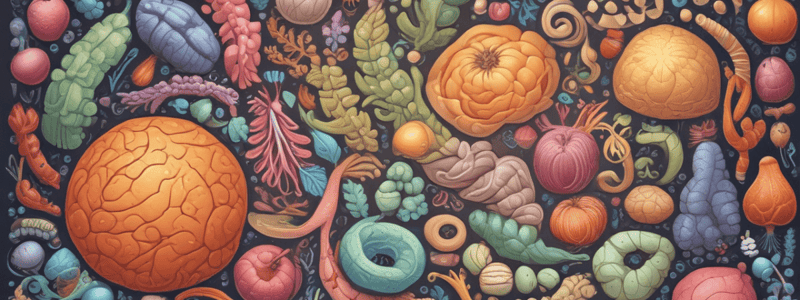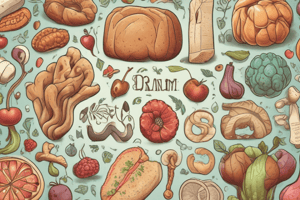Podcast
Questions and Answers
What are complex carbohydrates composed of?
What are complex carbohydrates composed of?
Monosaccharides bonded together, forming large chainlike structures.
What is the primary function of complex carbohydrates in plants and animals?
What is the primary function of complex carbohydrates in plants and animals?
To store energy or make certain structural components.
What are the two types of polysaccharides that contain hundreds of glucose molecules?
What are the two types of polysaccharides that contain hundreds of glucose molecules?
Starch and glycogen.
In what form do plants primarily store glucose as starch?
In what form do plants primarily store glucose as starch?
What are some rich food sources of starch?
What are some rich food sources of starch?
Where does the human body store limited amounts of glucose as glycogen?
Where does the human body store limited amounts of glucose as glycogen?
Why are animal foods not typically sources of glycogen?
Why are animal foods not typically sources of glycogen?
How many kcal does each gram of starch supply?
How many kcal does each gram of starch supply?
What is the fiber content of 1 cup of cooked black beans?
What is the fiber content of 1 cup of cooked black beans?
Rank the following foods from highest to lowest in fiber content per serving: green peas, baked potato, and prunes.
Rank the following foods from highest to lowest in fiber content per serving: green peas, baked potato, and prunes.
How much fiber is in 1 cup of strawberries?
How much fiber is in 1 cup of strawberries?
What is the fiber content of 1 cup of chickpeas?
What is the fiber content of 1 cup of chickpeas?
Which of the following breakfast cereals has the highest fiber content per serving: Kellogg's Raisin Bran or Kellogg's All-Bran?
Which of the following breakfast cereals has the highest fiber content per serving: Kellogg's Raisin Bran or Kellogg's All-Bran?
What is the fiber content of 1 slice of whole-grain bread?
What is the fiber content of 1 slice of whole-grain bread?
What is the primary function of fiber in plants?
What is the primary function of fiber in plants?
What type of bonds connect monosaccharides to form complex carbohydrates?
What type of bonds connect monosaccharides to form complex carbohydrates?
What is the only type of fiber that is not a carbohydrate?
What is the only type of fiber that is not a carbohydrate?
What happens to fiber that is not used by gut microbiota?
What happens to fiber that is not used by gut microbiota?
What are the two types of dietary fiber?
What are the two types of dietary fiber?
What happens to soluble fiber in water?
What happens to soluble fiber in water?
What is a rich source of insoluble fiber?
What is a rich source of insoluble fiber?
What happens to fiber content when grains undergo refinement?
What happens to fiber content when grains undergo refinement?
What is a benefit of soluble fiber in the body?
What is a benefit of soluble fiber in the body?
What type of foods provide dietary fiber?
What type of foods provide dietary fiber?
Study Notes
Complex Carbohydrates
- Complex carbohydrates (polysaccharides) are composed of monosaccharides bonded together, forming large chainlike structures.
- Plants and animals use complex carbohydrates to store energy or make certain structural components such as stems and leaves.
- The most common dietary polysaccharides consist of hundreds of glucose molecules and include digestible and nondigestible forms.
Starch and Glycogen
- Starch and glycogen are polysaccharides that contain hundreds of glucose molecules bound together.
- Plants store glucose as starch, primarily in the form of amylopectin, in their seeds, roots, and fleshy underground stems called tubers.
- Rich food sources of starch include bread and cereal products made from wheat, rice, barley, and oats; vegetables such as corn, squash, beans, and peas; and tubers such as potatoes, yams, taro, cassava, and jicama.
- Each gram of starch supplies 4 kcal.
Fiber
- Fiber is a complex carbohydrate composed of monosaccharides connected by bonds that humans cannot digest.
- Cellulose, hemicellulose, pectin, gums, beta-glucans, and mucilages are polysaccharide forms of fiber.
- Lignin is the only type of fiber that is not carbohydrate.
- Fiber is not digested, but it may be metabolized (fermented) by gut microbiota.
- Fiber contributes to stools (fecal residue) that are eventually eliminated during bowel movements.
Types of Fiber
- There are two types of dietary fiber, soluble fiber and insoluble fiber.
- Soluble fiber dissolves or swells in water, while insoluble fiber does not dissolve in water.
- Rich sources of soluble fiber include oat bran, oatmeal, beans, apples, carrots, oranges, and psyllium seeds.
- Rich sources of insoluble fiber include whole-grain products, including brown rice.
- Plant foods usually contain both soluble and insoluble fiber.
Benefits of Fiber
- Soluble fiber can help reduce blood cholesterol levels.
- Insoluble fiber may ease bowel movements.
- Fiber provides important health benefits when added to the diet in adequate amounts.
Studying That Suits You
Use AI to generate personalized quizzes and flashcards to suit your learning preferences.
Description
Learn about complex carbohydrates, their composition, and functions in plants and animals, including starch and glycogen




